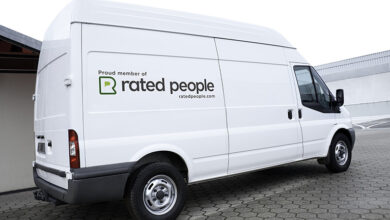A tradesperson’s guide to business bank accounts & loans
Managing your income as a self-employed tradesperson is much easier when you’re with the best bank for your small business’ needs. From loans to bank accounts, a bank can offer you the financial tools you need to reap all the benefits of your hard work. Make sure you choose the best bank for you by reading DNS Accountants’ advice on small business banking, below.
Skip to:
- Small business banking: Top questions to ask a bank
- What is digital banking?
- Types of loan
- Government grants for the self-employed
- Government loans for the self-employed
Small business banking: Top questions to ask a bank

The bank you choose to work with needs to be clear about what will happen to your money once you’ve started banking with them. Consider asking the following questions when you’re talking to a bank about opening an account for your small business:
- Bank charges: What exactly will you be paying for once you‘ve signed and handed in all the forms?
- Account fees: How much will you be paying per transaction, and what transactions are you allowed to perform?
- Overdraft: Will you be paying for this feature at the end of every month? Or will you be allowed to extend the payment once you’ve used other account services?
- Business credit cards: What will happen to your credit score if you take out a credit card on top of using an overdraft? How will this affect the possibility of you being able to make larger purchases once your account is up and running?
- Shared investments: Has the bank recommended any shares that you can invest in that will become profitable to you and your business after a specific amount of time?
- Long term savings: Does this bank account allow you to put money away towards your retirement, as part of one of its features where you can manage the money on your own?
What is digital banking?

Digital banking has revolutionised the way we do business. Not only are you able to see what’s happening in your bank account at any time of the day, but you can also perform transactions from the palm of your hand, using a smartphone app. So, there’s no need to wait in long queues at the bank anymore! You can safely perform transactions anywhere, anytime. Banking apps are password-protected, so providing you don’t use your birthday as a password, your money should be safe.
Types of loan

Loans from a bank or any other lender can be tricky when you’re self-employed. One thing that you want to do is remain as debt-free as possible. This is so you can pour any disposable income back into paying off existing debt or into your savings to grow your business.
Most loans are unsecured and require you to have a clear credit score to qualify. The bank will need you to have all your paperwork up to date and to have nothing outstanding, especially with HMRC. This way, they can be confident that you can still manage to pay your bills whilst paying back the loan.
Unsecured loans
These are often the quickest and most accessible loans for any self-employed business owner to qualify for, if you have a good credit record and transparent business practices that you can quickly look through. The less complicated your admin is, the better.
Secured loans
This type of loan could put your business in danger, if you’re unsure about your business’s future and don’t have transparent business practices. You’ll need to use your property as collateral, in case you’re no longer able to make repayments. The only time these loans are advisable is if you have someone willing to stand as a guarantor for you. This is so you don’t end up losing your property. Plus, this’ll mean you can comfortably buy yourself some extra repayment time if needed.
Government grants for the self-employed

A range of small business grants can help your business grow, without bleeding you dry through repayments.
Government-backed soft loans have more lenient terms, such as allowing you to pay the money back in smaller instalments.
Direct equity can give you the money you’ll need to start a business from scratch. But, you’ll likely need to have at least 50% of the value of the grant before you’re given all the money. This percentage acts like collateral, so the lender won’t take your home if you take too long to pay.
Equity finance can help startups under two years old manage their tax repayments. They can also help older businesses grow by using the extra money for stock or equipment.
Search for government grants for your business using the Finance and support for your business finder on Gov.uk.
Government loans for the self-employed

The Start Up Loan scheme offers unsecured personal loans of between £500 and £25,000. Plus, you’ll get free support with writing your business plan and 12 months of free mentoring.
The government has put together a package of coronavirus support for businesses of all sizes. This includes the Recovery Loan Scheme, which provides loans and other finance options worth up to £10 million.
You can find details of more government loans on Gov.uk.
There are many perks to running your own business, with lots of financial support available from various places. One of the most important things to know is that running a successful business depends on how much work you can win. Even if you have a solid plan for your business, you may benefit from a small business start-up loan or grant to improve your limited company incorporation or sole trading. You just need to be well informed about your choices and offers. So, take the time to read through all the paperwork you’re given, in order to make informed decisions.



